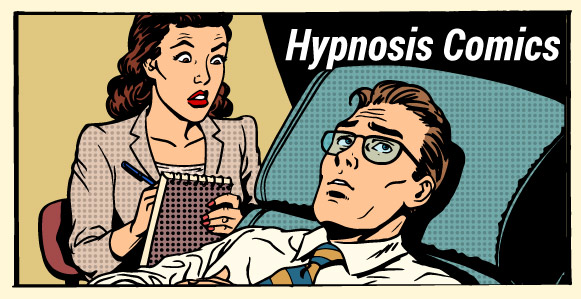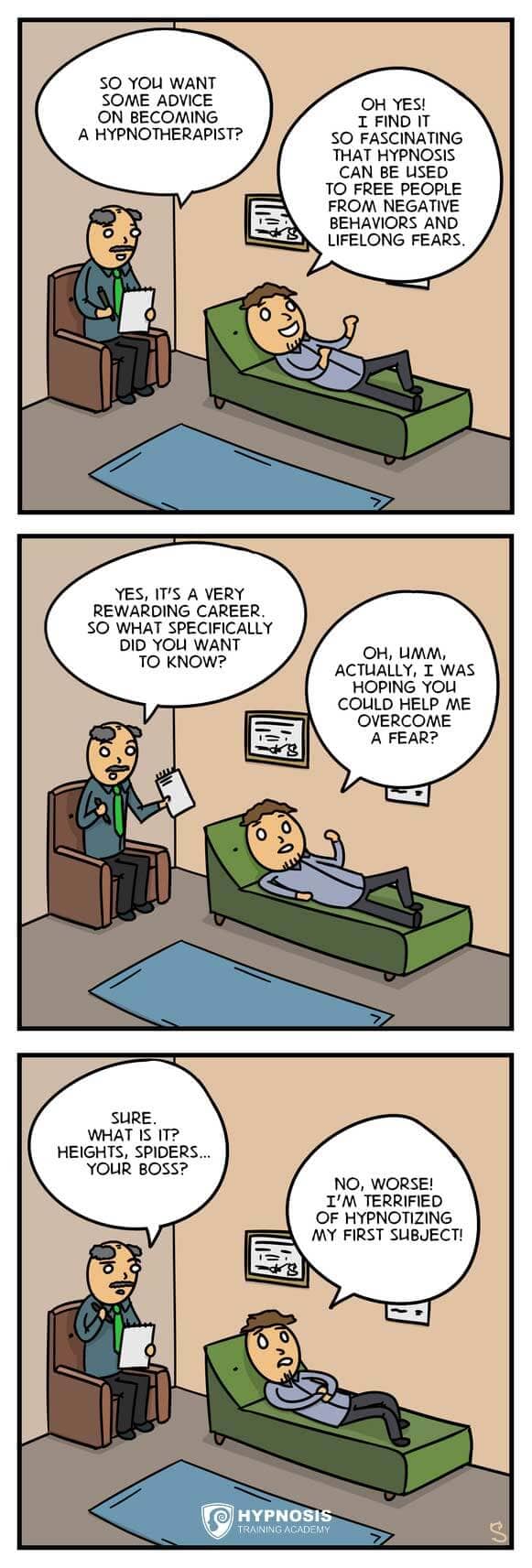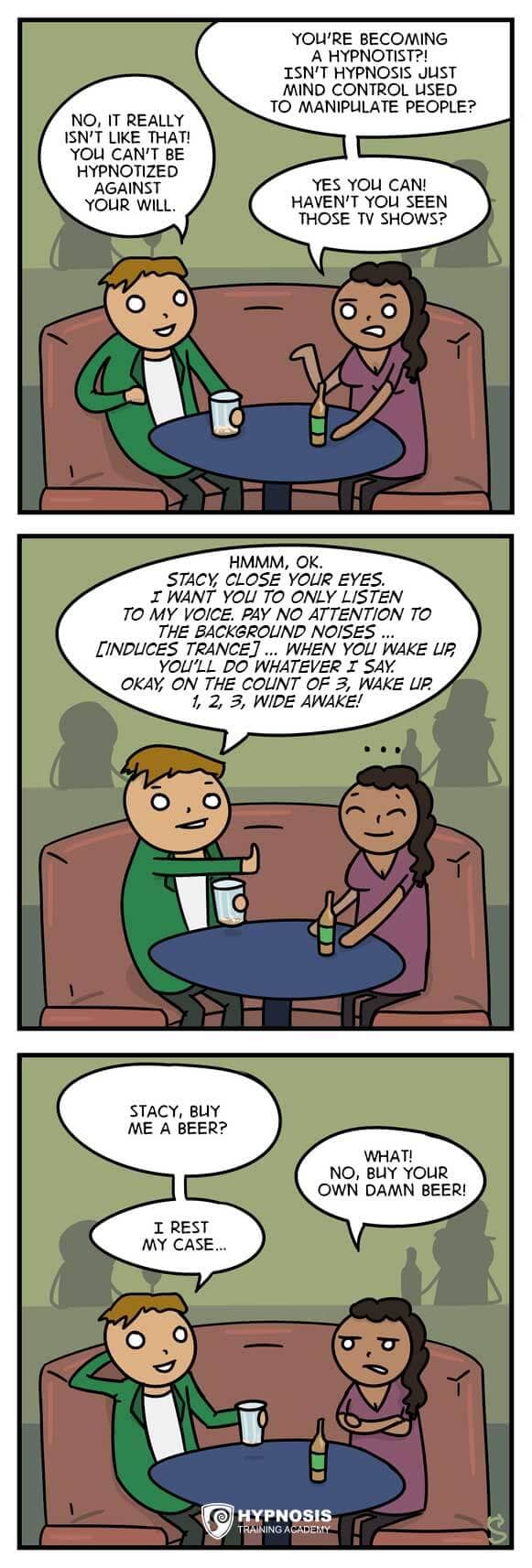
To most of the world, hypnosis is a curious profession.
Is it real?
Is it just mind control?
Will I get “stuck” in trance?
These are common questions hypnotists come up against throughout their careers.
Getting quizzed by people who are either simply curious or downright skeptical is one thing, but hypnotists have another issue to contend with. Especially when they’re starting out.
It’s natural in any profession to have doubts and reservations about your skills. As a hypnotist, you might worry about things such as:
Will I be able to hypnotize someone?
What happens when someone keeps coming out of trance?
Am I skilled enough to actually help others?
If any of these questions or fears rings a bell with you, read through the hypnosis comics below for a light-hearted look at some of the main issues. And some suggestions on how to deal with them.
1. First Time Nerves Over “Hypnosis Failure”

Yikes! What if you can’t hypnotize your first client? What if your mouth dries up, or you can’t get the words out? What if you get nervous and forget everything you’re supposed to know?
There’s always a first time. The trick is not to be too hard on yourself. You can’t expect to be a master at hypnosis without lots of experience behind you.
Like any other skill, the secret is really quite simple. Practice, practice, and then practice some more. If you try and you fail, then you just keep on trying. Failure is only another word for learning.
Sooner or later everything will fall into place and you’ll do it. And then you’ll feel amazing.
2. The “Skeptics” Favorite Question: Isn’t Hypnosis Just A Form Of Mind Control?

Look into my eyes…
Wouldn’t it be great if you could just say those words and put people under your spell? But you can’t, because in real life people have their own minds and their own freedom of choice.
Hypnosis has nothing to do with mind control.
That’s an image portrayed by Hollywood B-movies, just like the story of Dracula. But surely there aren’t many people who believe there are vampires walking amongst us.
To deal with doubters and skeptics, be prepared. Tell them exactly what hypnosis is and what it does. It’s just a form of focused relaxation that lets you turn your attention toward a single thought or idea. A way to shut out the outside world so you can deal with an issue quickly and effectively.
When people go for a massage, they don’t expect the masseur to rub their skin off as part of the process. They know the trained technician will help relax their muscles, reduce their stress and improve their circulation. Not because they have magic power in their fingers, but because they know what they’re doing.
>>Related video and articles:
- Debunking The 5 Most Common (And Downright Outlandish) Myths That Can Give Hypnosis A Bad Name
- 8 Hypnosis Myths Disproved: Magic, Mind Control & Trickery
- VIDEO: Myths Debunked – Is Hypnosis Mind Control?
3.The Client Who Experiences Trouble Being Hypnotized (Or Staying In Trance)

Having trouble getting someone into a trance? It happens. But the truth is that there are very few people who can’t be hypnotized.
So what can you do? Go back to basics.
If what you’re doing isn’t working, you need to do something else. Tweak your technique to suit the person you’re dealing with. Here are some quick tips on how to approach it.
Use the ABS formula
To hypnotize anyone, 3 things have to happen. You need to absorb their attention. You need to bypass their critical factor. You need to stimulate the unconscious mind.
Sounds like a lot, but you can do it all with one simple technique. Tell them a story. It could be a story about you, about someone you know, or about something you heard or read about.
>>Read related article: Hypnotic ABS: The Formula To Attention, Bypassing and Stimulating
Use H+
H+ stands for hypnosis plus. A little bit extra. Extra positivity, extra energy, extra enthusiasm. Be so passionate about what you’re doing that your client can’t help but be swept along by it all.
>>Read related article: What is H+ And Why It Will Instantly Make You A Better Hypnotist
Use Hypnotic Language
Remember the power of words to create mental images and associations in the mind. Like when you say “close your eyes and go into hypnosis.” Closing your eyes has nothing to do with going into hypnosis, but the phrase creates an association. As far as the unconscious is concerned, the two get linked.
Becoming a professional hypnotist takes time. It takes practice. There’s lots of trial and error, learning what works and what doesn’t work.
Don’t be afraid to adapt. The more you can refine your skills, the better those skills will become, and the easier and more natural the whole process will feel.
>>Read related article: The 11 Ways You Can Use Hypnotic Language To Influence Just Like Martin Luther King
Do any of these scenarios sound familiar to you? When you started out in hypnosis, what were some of the things you experienced? First-time nerves? Skeptical questions from friends and family? Doubts over whether or not you could make a profession out of hypnosis? Tell us what some of your experiences have been, and how you dealt with them (or continue to deal with them!), in the comments below.













